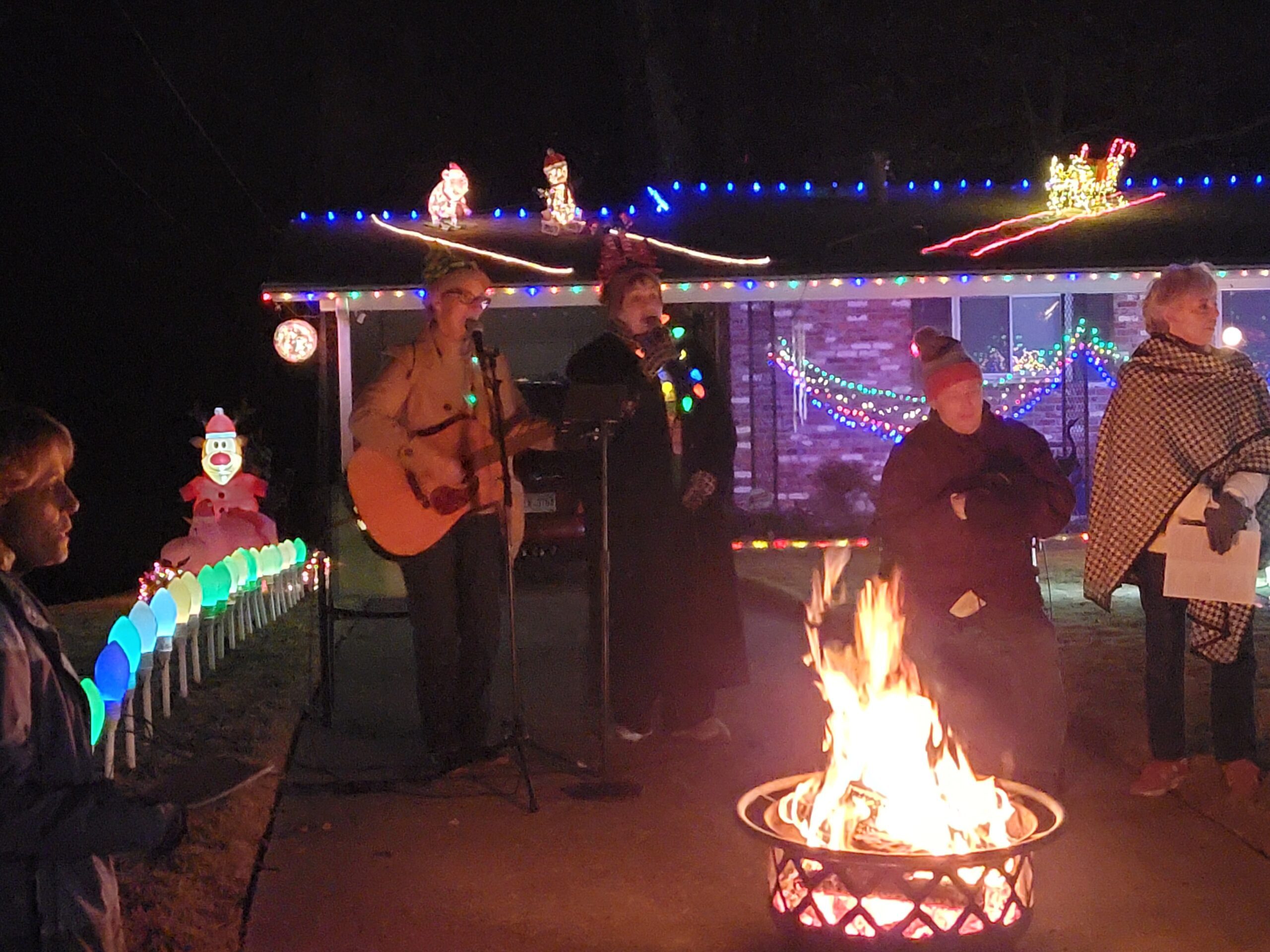Hark! the Herald Angels Sing

“Hark! the Herald Angels Sing” – December 8th, 2024 (Carols of Christmas, week 2)
Today’s Christmas Carol is based on the awe-inspiring scene described in Luke 2:13-14 (NRSV) – “And suddenly there was with the angel a multitude of the heavenly host, praising God and saying, ‘Glory to God in the highest heaven, and on earth peace among those whom he favors!’”
We’re going to learn a lot about this song today, but the first thing I notice about the story behind it is that it is an “everybody gets to play” song because so many people contributed to the carol as we sing it today. As I’ve delved into the story behind the song, it reminds me of one of Jeanne’s incredible quilts, pieced together over time with a lot of diverse contributions, hard work, and unexpected twists and turns, resulting in something unique and beautiful that helps us to better glimpse the goodness and glory of God! The pieces of a quilt also remind me of our beloved saying around Liberty Vineyard: we do small things with great love, reaching out to neighbors and nations, for the greater glory of God!
Let’s take a look at the history of this song and then we’ll delve a little deeper into the goodness, truth, and beauty of this beloved carol.
Charles Wesley, the younger brother of John Wesley, was an English Anglican cleric and a prolific hymnwriter who wrote as many as 10,000 hymns during his lifetime. If you wanted to follow in his footsteps and maintain a reasonable pace, you could write five songs each week, with two weeks off each year, for the next 40 years! We can see God’s generous grace and Wesley unwavering work ethic coming together to have left such a phenomenal legacy! Charles Wesley is known for writing hymns based on Scripture and for introducing Jesus into the Psalms. He continued the tradition of Christological readings of the Psalms that we saw in last week’s Christmas carol writer, Isaac Watts. Charles Wesley wrote two of what is known as the Four Great Anglican Hymns, including today’s Christmas carol. These are hymns that were widely popular among Protestant churches during the 19th century and have since been adopted by Catholic churches.
Charles Wesley has an interesting story that intersects our own here today. For a ten-month period in 1735-6, Charles Wesley served as a military chaplain at Fort Frederica on St. Simon’s Island, Georgia, while his brother John had been appointed by James Oglethorpe as the Anglican minister to the parish of Savannah. Even though they published the first Anglican hymnbook in America during that time, the brothers’ mission was considered unsuccessful, and they returned to England quite dejected. Less than two years later, on May 21st, 1738, Charles Wesley experienced an evangelical conversion (or “renewal of faith”), and his brother John had a similar (and more well-known) experience three days later. Charles Wesley then came to understand his divine calling as spreading the gospel to ordinary people by teaching sound biblical doctrine, primarily through the writing of hymns and poems.
One year after Charles Wesley’s renewal experience, in 1739, he was inspired as he walked to church one day by the ringing of the church bells. He then penned the hymn entitled Hymn for Christmas Day, with ten stanzas in his original composition.
Here are his first two stanzas:
HARK how all the Welkin rings Glory to the King of Kings, Peace on Earth, and Mercy mild, GOD and Sinners reconcil’d!
Joyful all ye Nations rise, Join the Triumph of the Skies, Universal Nature say ‘CHRIST the LORD is born to Day!’
It sounds somewhat familiar to what we sing today, but did you catch a completely unfamiliar word in there? The only people who understood the word welkin then, just as now, were few and far between, as it was an obscure theological term derived from the Old English word for cloud. Welkin has nothing to do with healthy relatives. Welkin actually refers to a place, the vault of heaven where angels dwell. Charles Wesley was calling on listeners to hear how the heavens ring because of the angels’ joyful exultation.
Nineteen years later, in 1758, a close colleague, George Whitefield made some alterations to the song. Whitefield and the two Wesley brothers were together the most influential founders of Methodism and the evangelical movement. Charles Wesley was quite happy for people to reprint his works, as long as no alterations were made, likely because he did not want to be blamed for someone else’s bad theology. For some unknown reason, Whitefield did not ask his friend for permission to alter the lyrics to this hymn. Understandably, this did not go down too well with Charles Wesley, and he refused to sing Whitefield’s version of his hymn. Among other changes, Whitefield removed two of the original stanzas, reducing the hymn to eight stanzas.
However, Whitefield’s alteration of the first two stanzas contains the familiar name of today’s Christmas carol:
HARK! the Herald Angels sing Glory to the new-born King! Peace on Earth, and Mercy mild, God and Sinners reconcil’d.
Joyful all ye Nations rise, Join the Triumphs of the Skies; Nature rise and worship him, Who is born at Bethlehem.
Those lyrics are closer but not quite yet the same as the Hark! the Herald Angels Sing we know today.
In 1760, English barrister, clergyman and writer Martin Madan combined pairs of stanzas, reducing the number of longer stanzas to four. Madan kept Whitefield’s lyrics for the first stanza, but changed Charles Wesley’s original second stanza to:
Joyful all ye Nations rise, Join the Triumph of the Skies, With th’ angelic host proclaim, / Christ is born in Bethlehem!
The 1782 and subsequent editions of Tate and Brady’s New Version of the Psalms of David removed the last stanza and added this refrain to the end of each of the three remaining stanzas: Hark! the herald angels sing Glory to the newborn King.
The original version of Charles Wesley’s hymn in what was now the middle stanza had read:
Christ, by highest Heav’n adored, Christ, the Everlasting Lord, Late in Time behold him come, Offspring of a Virgin’s Womb.
Veil’d in Flesh, the Godhead see, Hail th’ Incarnate Deity! Pleas’d as Man with Men t’appear JESUS, our Immanuel here!
In 1906, the editors of Hymns Ancient & Modern altered the second half of that to:
Veiled in flesh, the GODHEAD see, Hail, the Incarnate Deity! Pleased as Man with man to dwell, JESUS, our EMMANUEL!
And that is the story of the lyrics for Hark! the Herald Angels Sing.
But what about the music? The carol’s original melody was borrowed from another hymn. What we sing today is based on an 1840 composition by German composer Felix Mendelssohn, a cantata commemorating the 400th anniversary of Gutenberg’s invention of movable type. Authors and composers tended to bestow very long titles in those days. This composition is no exception: Ceremonial song for the opening of the celebrations taking place on the first day of the quadricentennial celebration of the invention of the art of printing on the market square in Leipzig.
Finally, British musician and organist William Cummings adapted Mendelssohn’s music to fit the lyrics, giving us the melody we know and love today!
Just as Hark! the Herald Angels Sing went through a lot of changes and twists and turns, so goes the course of our lives. Sometimes we look back at parts of our lives with great regret. We might be painfully aware of things we’ve thought, said, or done that we wish we could erase. We might fixate on lost opportunities for the things we didn’t say or do that in retrospect we now wish we had said or done.
The good news of Jesus Christ is all-encompassing. The good news of Jesus Christ affects every part of our lives, every dimension. The good news of Jesus Christ touches and transforms our past, our present, and our future. In the kingdom of God, nothing is wasted. God uses it all, the bits we are proud of and the bits we are ashamed of; the consequences we are aware of and the consequences we are ignorant of; our achievements and our failures; things that were planned and things that suddenly transpired; actions we did and actions that were done unto us; our delights, delays, disappointments, and devastations; our worship, working, wandering, and waiting. The good news is that God is the creator, sustainer, and restorer of all. God transforms ugly into beautiful, broken into restored, sin into forgiveness, emptiness into flourishing, death into life. Nothing is too difficult for God! Nothing is beyond God’s loving reach. All God asks is that we surrender all that we are in childlike trust to the will and the ways of God. It is not up to us to muster enough faith. We rely wholly and solely on the faithfulness of Christ Jesus, our Emmanuel, God with us. Jesus came to seek and to save, the heal and to deliver, to restore and to renew, to tend and to transform, to repair and to reconcile.
Again, let’s revisit the scripture from which this carol is drawn – Luke 2:13-14 (NRSV) – “And suddenly there was with the angel a multitude of the heavenly host, praising God and saying, ‘Glory to God in the highest heaven, and on earth peace among those whom he favors!’”
There are two significant phrases worth contemplating here:
- Glory to God in the highest heaven. The Greek phrase here, doxa en hypsistois Theō, speaks of the weightiness of God’s presence; God’s sovereignty, majesty, and authority over all creation; God’s divine nature and attributes; the visible manifestation of God’s presence; and the honor and praise that rightfully belong to God.
- Peace on earth. We talk a lot about shalom around here. The Greek word for peace here is eiréné, meaning wholeness. This describes what happens when all essential parts are joined together. Eiréné is God’s gift of wholeness.
Emmanuel, God-with-us, has come! Jesus Christ, through his death and resurrection, has reconciled God and humanity. And we have a part to play in sharing the good news of reconciliation! Let us join with the heavenly host praising God and saying, “Glory to God in the highest heaven!” Let us welcome, flourish, and delight in God’s gift of wholeness, peace on earth! Today’s Christmas carol invites us to “hark,” to give our attention to and to listen closely to the good news of the kingdom of God.
Emmanuel, God-with-us, invites all people into God’s story. And we get to participate in giving out invitations! We did something together a couple of weeks ago that is a great illustration for this. When we cleaned up trash together near Jackson Creek, it didn’t just affect the spot where the garbage had been discarded. It helped to facilitate the unhindered flow of clean water. Removing debris allows abundant life to flourish in and around our waterways. Similarly, we may have some debris we need to clear out of our own hearts. There are many things that can stand in the way of the good work of reconciliation that God wants to do in and through us. I want to invite us to examine our own hearts for any trace of pride, bitterness, anger, resentment, or miscommunication, and root those things out so that the Holy Spirit’s living water can flow unhindered. Confessing and repenting of these things will also allow abundant life to flow in and around us!
As we join Jesus in proclaiming and demonstrating the good news, we get to call out some “hark’s” of our own. May we wholeheartedly participate with Jesus in inviting, welcoming, and cherishing others into God’s story on the way of love.
Resting on the solid rock of Jesus Christ, we can declare with confidence all three stanzas of this beloved Christmas carol as we know it today. Please join me in reciting each of the three refrains, and for as many of the other words as you can:
Hark! The herald-angels sing ‘Glory to the newborn king; Peace on earth and mercy mild, God and sinners reconciled.’ Joyful all ye nations rise, Join the triumph of the skies. With the angelic host proclaim, ‘Christ is born in Bethlehem.’ Hark! The herald-angels sing, ‘Glory to the new-born king.’
Christ, by highest heaven adored, Christ, the everlasting Lord. Late in time behold Him come, Offspring of a Virgin’s womb: Veiled in flesh the Godhead see, Hail the incarnate Deity Pleased as man with man to dwell, Jesus, our Emmanuel. Hark! The herald-angels sing, ‘Glory to the newborn King.’
Hail the Heaven-born Prince of Peace! Hail the Sun of Righteousness! Light and life to all He brings, Risen with healing in His wings; Mild He lays His glory by, Born that man no more may die, Born to raise the sons of earth, Born to give them second birth Hark! The herald angels sing, ‘Glory to the new-born king.’




